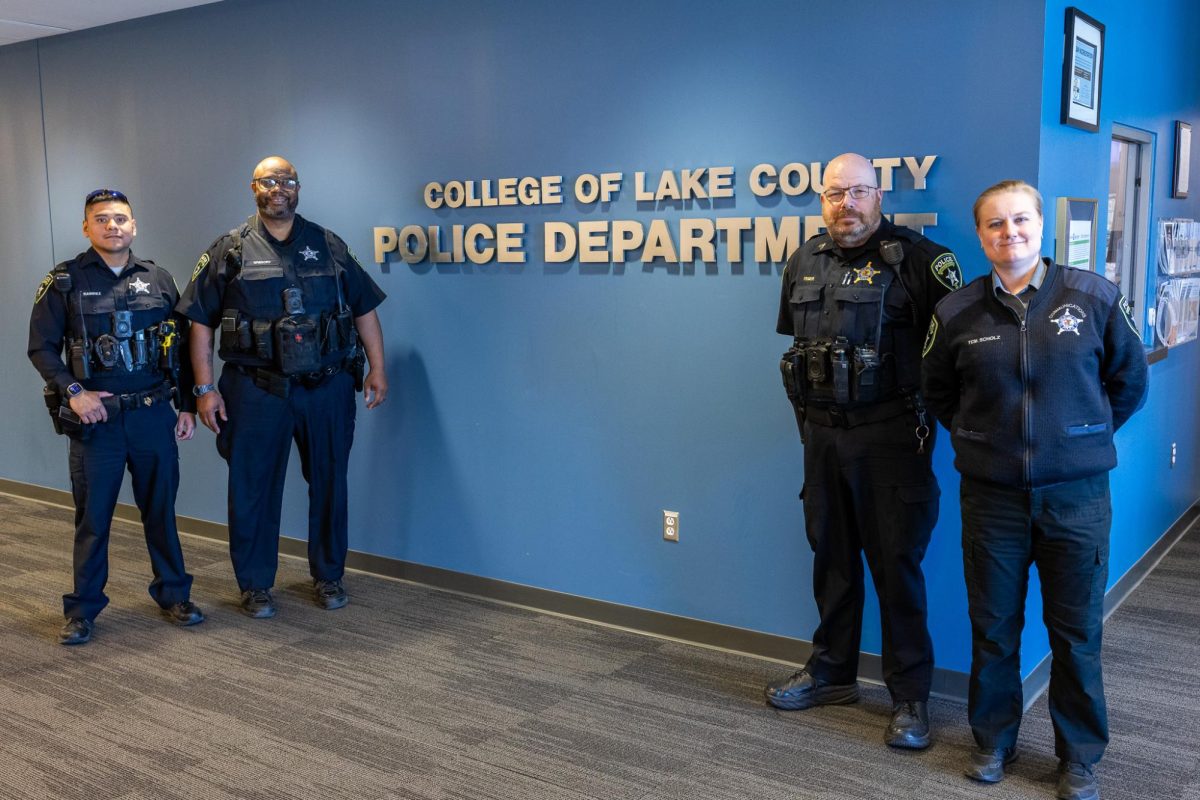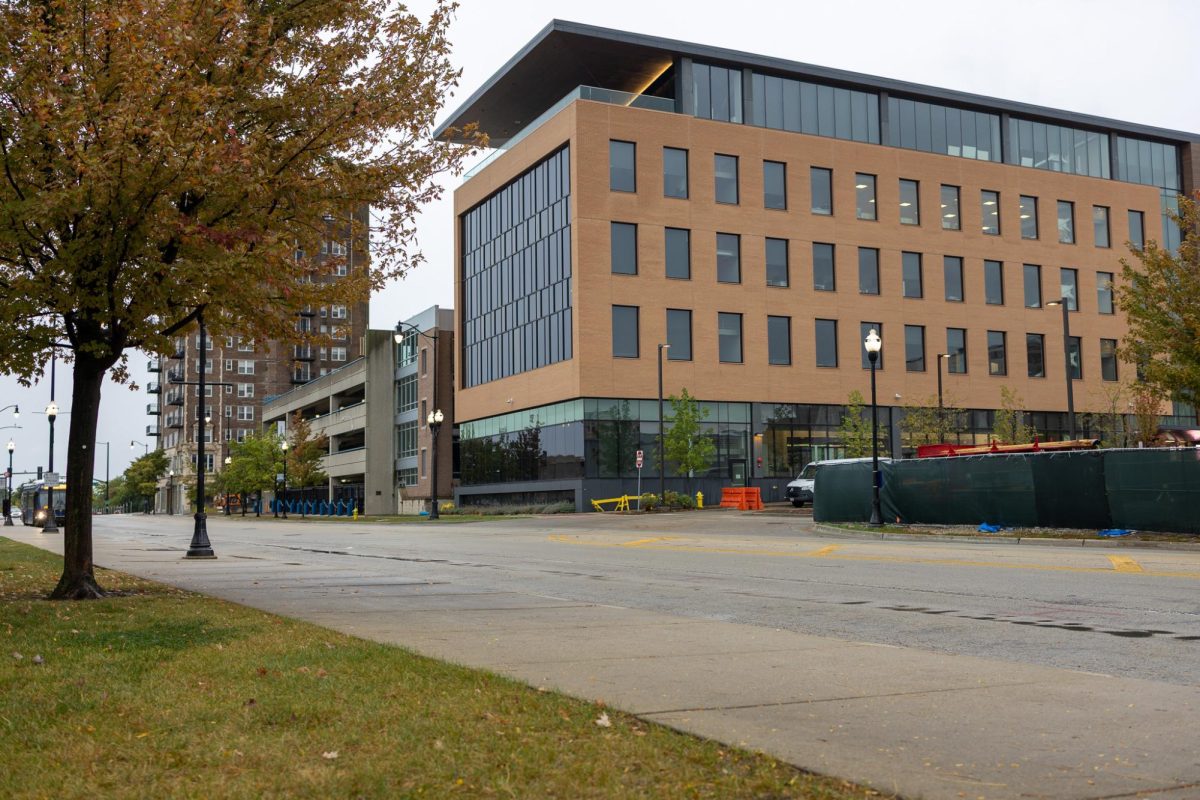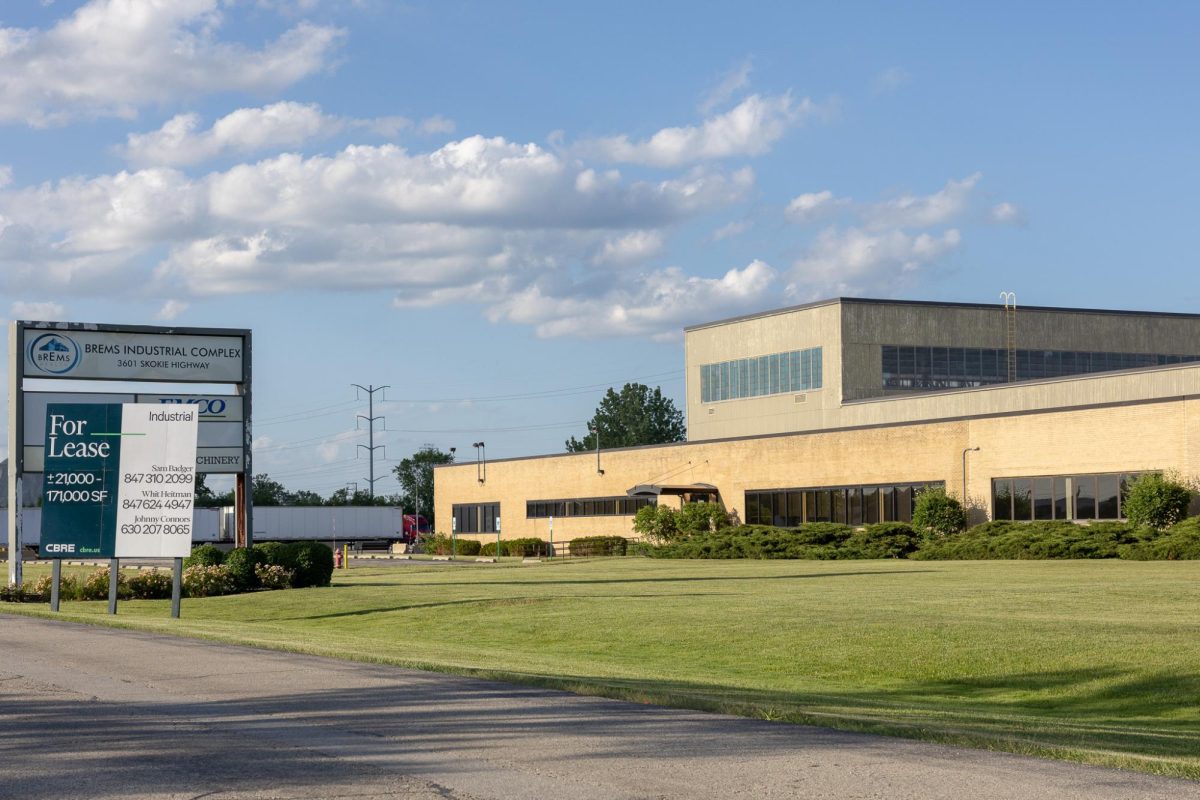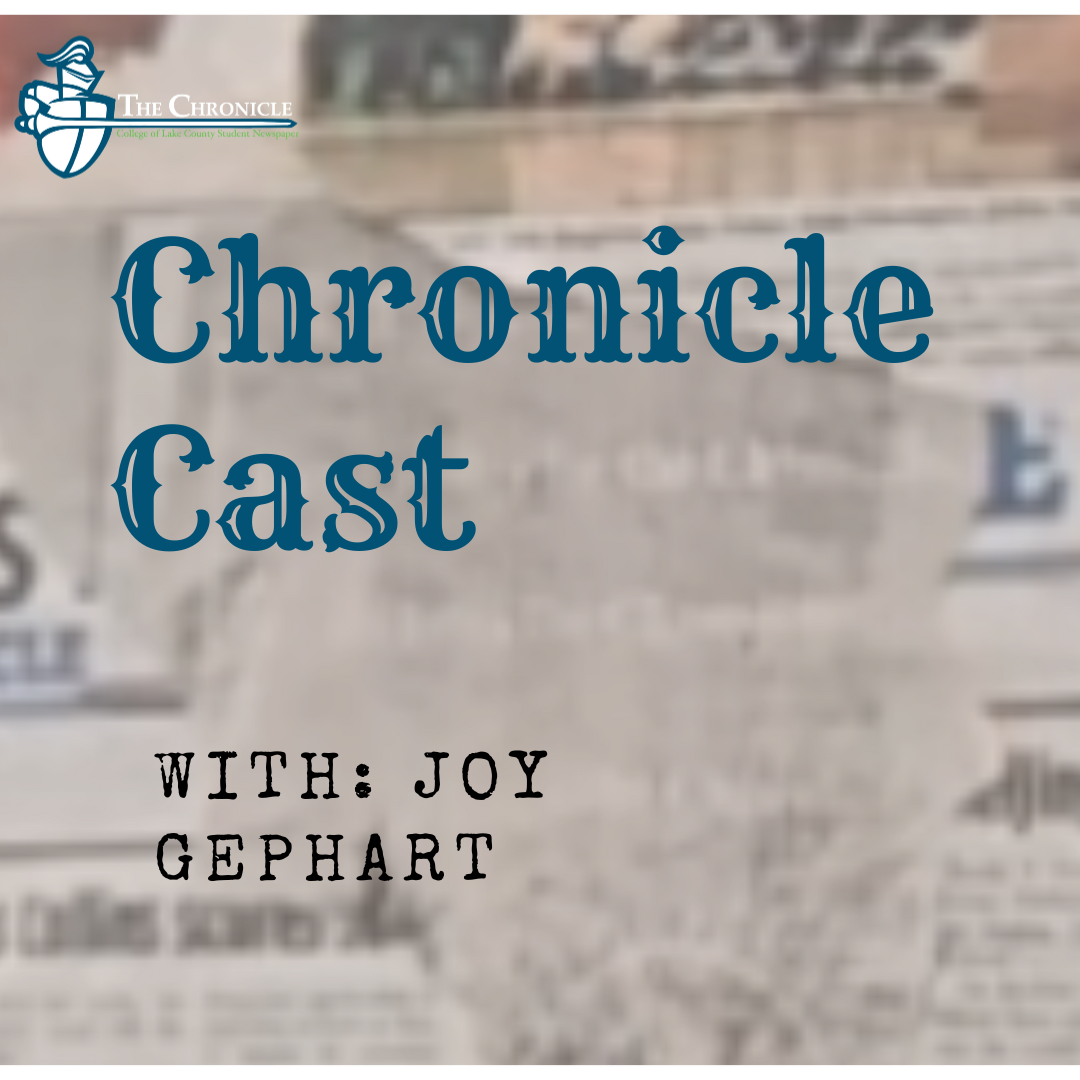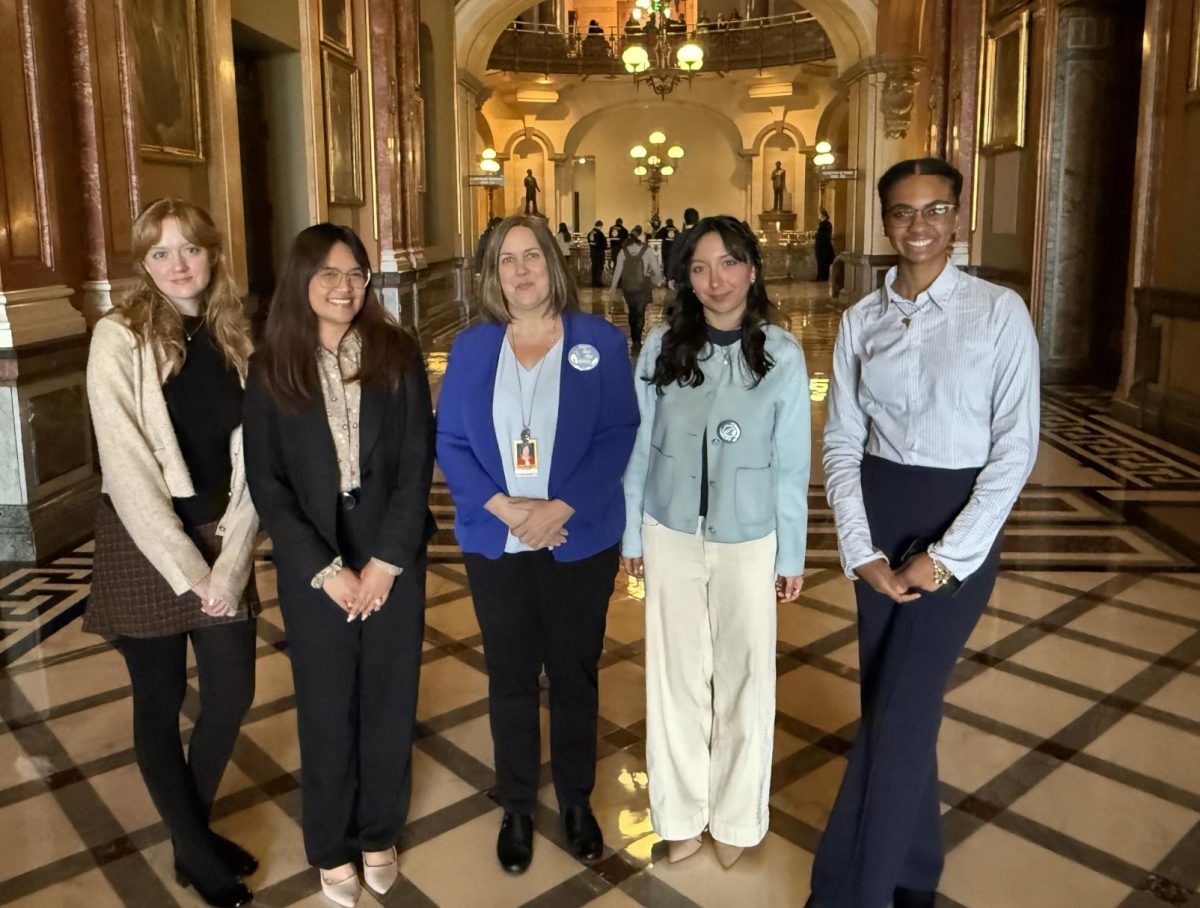College of Lake County has 19 sworn officers and five community service non-sworn officers patrolling campus and assisting students, staff and those in the Lake County community.
A police officer’s day begins at 6:45 a.m. They prepare for duty by gearing up and changing into uniforms before roll call at 7 a.m. During roll call for the Grayslake, Southlake, and Lakeshore campus, all officers receive information from the sergeant in charge, who shares last shift intelligence and current events pertaining to the daily operations. Each officer is assigned to an inside, outside, or float role and completes his or her rounds along with up to five other officers.
CLC has sworn officers and non-sworn officers patrolling the campus. The sworn officers wear navy blue uniforms and have the authority to arrest individuals and carry a weapon. Non-sworn officers, also known as community service officers, are dressed in light blue and can’t perform arrests, engage in traffic enforcement or carry a weapon like a trained and certified police officer could.
Sergeant Edmund Gregory, has served at CLC for 3 and a half years, and will be completing his 28th year as a sworn police officer next month. Prior to his current role, Gregory served in the Evanston police department for 23 and a half years. Now, for many students, Gregory is a familiar and friendly face, standing guard at the front of the main entrance of CLC.
Sworn officers, like Gregory, serve to keep the college campus as well-protected and secure as possible for the Lake County community. If any criminal activity or security threats were to happen around campus an officer in navy blue will be on site to deal with the situation.
Community service officers serve different roles at CLC. Their job consists of mostly unlocking doors, Managing lost property, and monitoring security cameras. However, those responsibilities can also be performed by sworn officers. While both positions serve different purposes, they are both here to serve and protect students.
One of the many concerns a student may have is the possibility of an active threat. Gregory said that officers have been trained to combat multiple situations, depending on the circumstances.
“If it’s a barricaded subject with a weapon then we generally wouldn’t just go in,” Gregory said. “We assess it when we get there, set up a command post and we would request that one of the special mobile forces come out with multiple units that have a lot more than what we have.
“If it’s an active threat, let’s say we have someone who comes in and shoots students in a classroom, then we’re going to assess it and then go in. it may be just one of us going in, it may be five of us, it all just depends on who we have on the campus at that point.”
While there haven’t been any cases of threats around campus, Students have expressed concern over the lack of necessary school shooting drills or information on what students should do during that kind of situation.
Gregory said that police officers at CLC offer volunteer training opportunities for faculty and staff on campus. However, that kind of training hasn’t been offered to students.
Lieutenant Vince Utter, a sworn police officer at CLC in charge of department training, said that the college offers two training programs. The first one Is called run, hide, fight.
“The first thing they want to do is run, and get out of the situation,” Utter said. “If you can’t hide and if they’re going to come find you, fight.”
Another program they offer is through the college called Alert, Lockdown, Inform, Counter, and Evacuate (ALICE) training that is available for people to sign up.
“It’s a more advanced and robust program on how to shut doors with material you have and find weapons like chairs or anything that you have in the room,” Utter said.
ALICE training is a volunteer and optional training for faculty and staff on campus. Utter and Gregory said they support students seeking information on what to do in case of an armed threat. However, they don’t see much participation.
“We would love to do training for students,” Utter said. “It isn’t just for faculty, it’s for kids too. It’s online, through the hub, so they could sign up and we could put up a class for them, but we barely get anybody until a national shooting happens and then suddenly the ALICE classes fill up.”
Apart from training and large-scale issues, officers also try to help and de-escalate situations before anything regrettable happens.
Gregory is a trained Crisis Intervention Officer (CIT) and deals with individuals that may be experiencing an issue and helps them calm down to seek the resources and support they need. During a recent situation involving a faculty member and a student, Gregory stepped in and introduced his credentials. Supporting the student, he provided the help they needed and directed them to CAPS for further assistance.
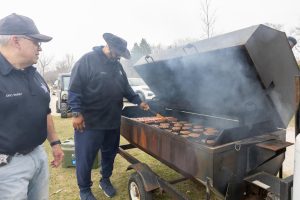
(left to right) John Paret, Edmund Gregory (Emmer Saucedo )
As part of their mission to connect with students, the officers have also introduced events that help build close relationships.
Officer Jon Paret, also a sworn officer, created Coffee with a Cop, where students get to connect with Law Enforcement Officers to encourage the campus community to bridge the gap between higher management and student life.
Gregory has created a branch out event called Cookout with a Cop, an opportunity for students to interact with Police Officers while enjoying a meal and watching a CLC baseball or softball game. As a coach for the CLC basketball team himself, he felt that the event would bring people together to watch the athletes play while also showing that the officers at CLC are here to support students.
“We are here for you,” Gregory said. “We are here to support you. You’re the reason why we’re here and we want to have an open dialogue and communication with the student body. We don’t want the student body to come in fearing us, we want the student body to engage with us.”
After three years of being a CLC officer and a men’s basketball coach, Gregory said that the thing that he enjoys most around here is “the students, coaching,” and “involvement.”
“We are not just police officers walking around here, we’re actively a part of the college community,” Gregory said.

